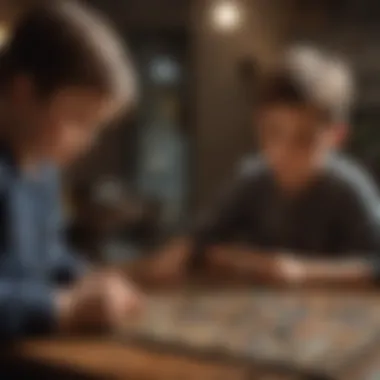Exploring Puzzle Games for Four-Year-Olds: Benefits & Picks


Intro
Puzzle games have long held a special place in the hearts of parents and children alike, particularly for those around the age of four. This age group bursts with curiosity and a desire to explore their world. Puzzle games offer an ideal way to harness that energy, providing not just entertainment but also significant developmental benefits. Exploring this vibrant landscape of games reveals how they can help nurture cognitive, social, and emotional skills in young children.
When selecting puzzle games, parents should look for key features that make them suitable for four-year-olds. A good puzzle game should incorporate age-appropriate challenges that don’t overwhelm the child but still keep them engaged. Interactive elements can also enrich the experience, as they allow little ones to not just solve puzzles but become active participants in the game.


In the following sections, we will navigate through various aspects of puzzle games designed for children of this age. We will touch on popular types of puzzles and specific titles that come highly recommended, all while emphasizing the balance between play and learning that is crucial for healthy development. Let's kick off this exploration by diving into the latest happenings in the world of gaming that touch on these engaging tools.
Preface to Puzzle Games for Young Children
Navigating the landscape of childhood development exposes a myriad of tools that facilitate learning through engagement. One such tool is puzzle games, intricately designed to align with the cognitive and emotional needs of four-year-olds. This section underscores how these games foster essential skills, stimulating young minds while providing enjoyment.
As children step into the preschool phase, their brains undergo a significant transformation. The introduction of puzzle games at this early stage taps into crucial developmental milestones. Engaging in puzzles helps children enhance their problem-solving capabilities, which are paramount as they approach formal education. Parents and educators alike often overlook this, dismissing play as mere entertainment rather than essential cognitive training.


Understanding the Importance of Play
Play is more than just a delightful distraction; it’s a fundamental mechanism that drives learning. During one’s formative years, children learn best when they’re having fun. The importance of play cannot be overstated, especially for four-year-olds who are still exploring the world around them. Play encourages the development of creativity, social skills, and emotional intelligence. In this context, puzzle games serve a dual purpose.
- Cognitive Growth: By piecing together puzzles, children practice logic and reasoning, which sharpen their critical thinking. This builds a foundation for academic skills in the future.
- Fine Motor Skills: Manipulating puzzle pieces enhances dexterity. As they fit pieces together, kids improve their hand-eye coordination.
- Social Interaction: Whether played solo or with peers, puzzles foster social skills. Children can share strategies and celebrate wins together, making teamwork a natural part of the experience.


As such, the act of playing puzzles becomes a powerful lesson in collaboration and communication, skills that will pay dividends later in life.
What Defines a Puzzle Game
Identifying what distinguishes a puzzle game is key to understanding its value for children. Puzzle games come in various formats—from traditional jigsaw puzzles to digital apps. However, certain characteristics define them, making them suitable for young players.
For four-year-olds, a puzzle game typically features:
- Age-Appropriate Challenges: The difficulty should match a child’s developmental level. If it's too hard, it becomes frustrating; if too easy, it loses its charm.
- Interactivity: Games must engage children actively. Interactive elements keep them focused and eager to learn. A puzzle that responds to a child’s input reinforces their sense of achievement.
- Cognitive Engagement: The game should require thought processes, asking the child to identify patterns, make decisions, and draw conclusions while having fun.
"In essence, the joy of solving puzzles lies not just in completing them, but in the journey children embark upon through trial and error, determination, and critical thinking."
By honing in on these characteristics, parents can better determine which puzzle games will resonate most with their children, all while promoting a fun learning experience. Understanding these elements allows for targeted choices tailored to the specific needs of four-year-olds, ultimately enriching their playtime.



